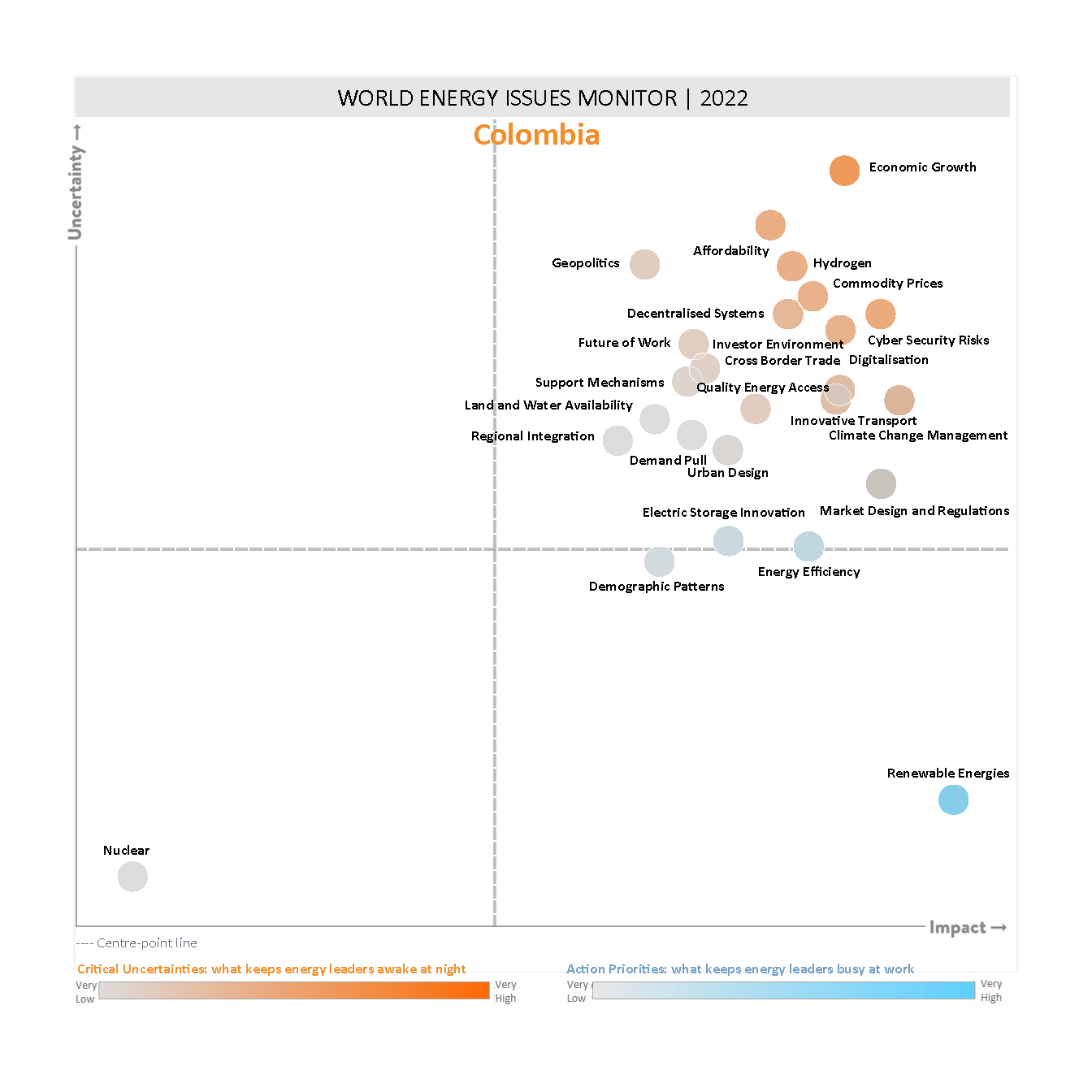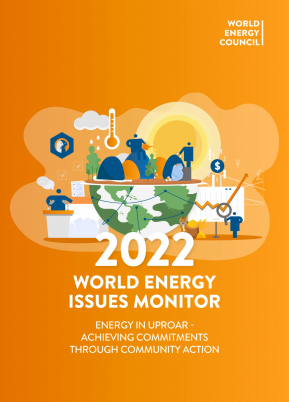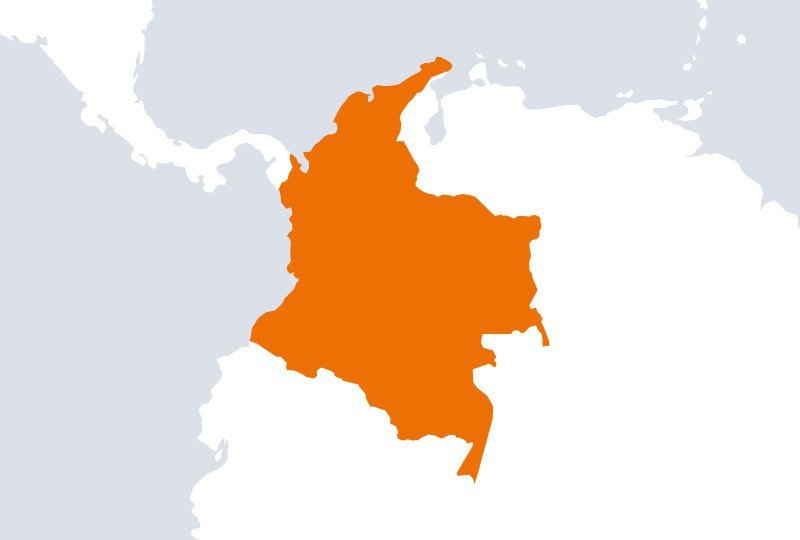The Colombian World Energy Council Member Committee aims to study and implement of projects aimed mainly at the rational use of energy resources in all its aspects, in order to promote sustainable energy development. These projects consider the production, transportation, distribution, marketing and use of energy for maximum benefit, taking into consideration global trends in regulation and minimizing environmental impacts. COCME’s mission is to promote the sources and sustainable use of energy to provide greater benefits for people.
José Antonio Vargas Lleras is the World Energy Council’s Vice Chair for the Latin America & Caribbean region and also serves as Chairman of the Colombian Committee of the Council. Since 2006 he has been Chairman of the Board of Directors of Electricity Distribution Company CODENSA and of Electricity Generation Company Emgesa, subsidiary firms of Enel-Endesa in Colombia. Dr Vargas Lleras has been Chairman of the Energy Commission for Regional Integration (CIER) and has held several managerial positions in many companies in the Colombian electric sector including the post of CEO of the Bogota Power Company. Professionally trained as a lawyer, and also a university professor, he has served as an Ambassador to the European Union and the Permanent Representative of Colombia to the World Customs Organisation.
Daniel Felipe Diaz Toro serves as Executive Secretary of the World Energy Council, Colombia and is in charge of the organisation. He holds two undergraduate degrees and two master's degrees. He has a Master's in Business Administration MBA from Eafit University and another in Energy Transmission and Distribution Engineering from Universidad Pontificia Bolivariana. He is an Electrical Engineer, as well as an Electronic Engineer from Universidad Pontificia Bolivariana. In addition to his role as Secretary of the Colombian Member Committee, he is a Professor of Energy Sustainability, R+D+I in the energy sector and Smart Grids.
Energy in Colombia

Economic growth continues to be the largest uncertainty for survey respondents. Colombia has experienced considerable post pandemic growth, reaching 10%, and allowing the country to level out with growth rates seen before the crisis. This has led to an increase in energy demand and hence a more encouraging outlook for the sector in the coming years.
This year´s Issues Monitor map is an accurate snapshot of the current situation in the country, with renewable energies being a top action priority. This is related with the fact that in past years the government has become a driving force in the implementation of renewable energy in the country, through regulatory packages, public policy, and auctions. This effort has resulted in an unprecedent increase in renewable energy sources (solar PV, wind, and small hydro), jumping from a 1% participation in 2018 to a 6% equivalent in 2021, representing approximately 1055MW of installed capacity. An exponential growth trend in renewable energy participation is expected to continue, given there is little uncertainty around developing these energy sources in the country today.
Together with renewable energies, the map shows energy efficiency as another action priority, which has been the case for many years. Both government and private sector continue to see energy efficiency as a top priority. In the case of government, they have spent important number of resources in efficiency programs, like PROURE (Program for the Rational and Efficient Use of Energy).
The pandemic has been an undisputable trigger for digitalisation in the energy sector, and the country has seen an increase in smart metering, transport electrification, network automatization and storage. However, increased digitalisation in energy brings increased exposure to cyber risks which is reflected in the uncertainty shown in this year’s national Issues Map. There’s a call for action for the government to develop policies and guidance which will guarantee the resilience of the sector to such risks. Currently, there’s a new regulatory framework in place which is incentivizing and remunerating distribution companies which invest in increasing their digital capabilities. Furthermore, the ministry has set out a target for 75% of clients having installed smart metering infrastructure by 2030. From the billing perspective, the pandemic has led to important shifts in consumer preferences, with the majority of consumers now preferring digital billing and digital communication channels with companies, compared to traditional channels. This change in preferences and acceleration in digital relationship with clients has allowed energy companies to establish uninterrupted communication channels with consumers allowing for a better service provision.
Innovative transport is another issue that clearly shows up in the map as a matter of high importance and high uncertainty for respondents. Colombia is experiencing an electric mobility revolution. Targets, which had been set by the government a few years ago, of 6000 electric and hybrid vehicles, has been reached earlier than expected and this trend is expected to continue. This increase in demand for electric transport has been driven by strong public policy and regulations which favour innovative and efficient transport in both private and public sector.
A great concern which keeps Colombian energy leaders awake at night is hydrogen. The government has launched the country´s hydrogen roadmap with clear targets to be met by 2040 and 2050.
In this sense Colombia has joined a privileged list of countries which have launched their national strategies already. However, hydrogen is a new technology which generates uncertainty for local players in many areas, including uncertainty around demand and uses.
In conclusion, this year’s Issues Monitor map is an accurate snapshot of the current situation in Colombia, and balances very well the different views and diversity of the local energy sector, thanks to a large number of diverse responses achieved.
Acknowledgements
Colombia Member Committee
Daniel Diaz
Downloads

Colombia Energy Issues Monitor 2022
Download PDF
World Energy Issues Monitor 2022
Download PDF






_368_520_s_c1_c_c.png)






